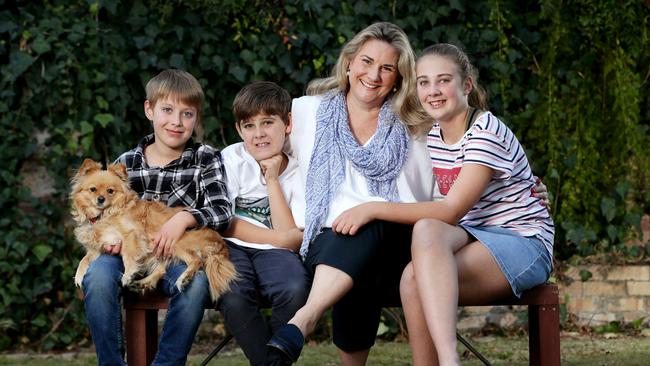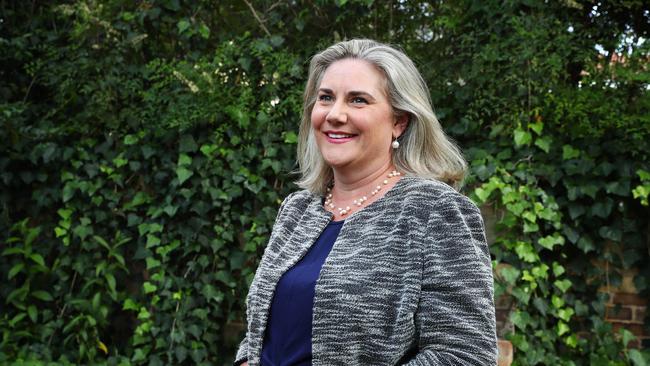Senator Hollie Hughes: I didn’t need a quota to get here
Mother-of-three Hollie Hughes, who is heading to the Senate aiming to help people living with a disability, says hard work and resilience — not a quota — got her there.
A doting mother-of-three from Moree who became the Liberal Party’s newest female senator this week says she’s proof the party doesn’t need gender quotas.
Hollie Hughes grew up in Adelaide before moving to Bathurst as a teenager, where she studied journalism.

Two decades later she is married to Stewart, an ex-contract farmer, and juggles politics and motherhood from their family home in Roseville, in Sydney’s north.
But for Hughes, gender and motherhood were never part of her political story.
“I really had to fight at every step of the way and it had nothing to do with gender,” she said.
“This election we have seen some unbelievable women elected to parliament and there are also the untold women who are not being spoken about with seats where they might not have won but we gained swings. That’s pretty impressive in itself.
“You just have to look at the volume of women coming through the Liberal Party to know that it is based on merit.
“I’m not a big fan of quotas because I think people make choices in their own lives for different reasons.”
Hughes weighed in on the decision of Chifley MP Ed Husic to step down from Labor’s frontbench to make room for the party’s female superstar Kristina Keneally, who went on to become Labor’s Home Affairs and Immigration spokeswoman.
GETTING IN ON THE MERITS
Husic said he had personally elected to step down for Keneally rather than being asked to step aside.
“While I’ve loved being a shadow minister, I won’t be running for re-election to that role today,” he said in a statement at the time.
“Instead I’ll be backing my great friend Kristina Keneally for that spot. We need to ensure someone of Kristina’s enormous talents has the opportunity to make a powerful contribution on the frontline, in the Senate.”

Hughes said it was the wrong way to get a senior position in politics.
“Gender has just never been part of my journey or conversation before,” she said.
“The idea of someone standing aside for me, while I’ve never required it and would never ask for it, I would quite frankly find it embarrassing to find that is how I got somewhere, someone standing aside for me.”
Her stance was in stark contrast to Keneally’s maiden speech as Labor’s Deputy Leader of the Senate.
“I would like to acknowledge that the Labor Party, the great Australian Labor Party, does take seriously inclusion, does take seriously supporting women, does take seriously its responsibility to do that, not just within its political processes but also in the wider community,” Keneally said.
It took nearly a decade for Mrs Hughes to win a spot in the upper house, with her name first appearing in fourth spot on the ballot in 2010.
Six years later her name was at the top of the Liberal Party’s list, until the double dissolution election dropped her into the unwinnable sixth spot.
Her hopes were dashed yet again in 2017 with her part-time position at the Administrative Appeals Tribunal making her constitutionally ineligible for office under Section 44.
Hughes says dealing with these setbacks has made her stronger, but she says the “adversarial” nature of politics does make it hard to attack women at the ground floor.
“I kept fighting and have had a couple of kicks along the way … I won a preselection and got bumped down a few spots for sitting ministers,” she said.
“Being able to demonstrate a certain level of resilience in politics is essential and I think a lot of women are incredibly resilient.
“I think the highly adversarial nature of it and the highly personal nature of it and the discourse turning into highly personal attacks on people doesn’t attract people to politics, men or women.
“If you are not highly motivated for a specific reason it is no wonder people say it isn’t a good idea to be a politician. There is more money to be made in the private sector.”
FINDING RESILIENCE
Hughes’ life changed in 2012 when her middle child Fred was diagnosed with autism.
It prompted her to start the Country Autism Network to help families in her community dealing with disability.
“When I look at some of the mums I work with in the disability space, there are no more resilient people in this country,” she said.
“Part of the issue is that the system is overly complicated and the processes need to be broken down and explained.

“That is something I’ve become passionate about from both my own experiences with disability but also working with families going through the same thing.”
Her focus in the Senate will be on isolating issues within the National Disability Insurance Scheme to address problems she’s encountered on the frontline.
“It isn’t perfect and the only way we can improve on issues is by figuring out exactly what they are,” she said.
“I want to help people understand the system because that can be the biggest barrier.”



